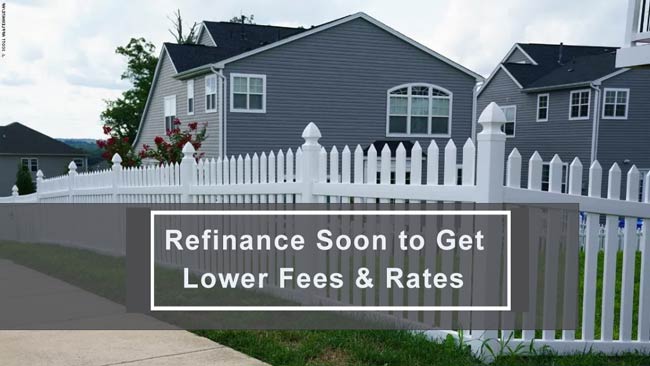
Refinance Fee Delayed. Begin Soon & Save.
FHFA’s refinance fee was postponed for 90 Days by lawmakers. Mortgage rates went up suddenly during the past three weeks. Without a locked-in rate, borrowers seeking to refinance noticed discounts, credits, and savings start to slip away.
Why did interest rates rise?
The first reason was rise in the 10-year treasury bond from .52 to .74.
Lenders normally charge more interest on mortgages when the yield on the 10 year bond rises, which means that record low points also translate into much lower interest rates on mortgages due to lowered interest.
A second reason was a new refinance fee that was scheduled to begin on September 1. The fee has since been pushed forward to December 1.
Keep in mind, refinancing requires about a month to complete. And mortgage rates are inclined to go up before the fee starts. Homeowners seeking the lowest-possible interest rate should be ready to apply for a refinance 2-3 months before December 1, which is not far away.
The fee is adds up to 0.5% of the loan amount.
That means if you had a $400,000 refinance, the new fee would amount to an additional cost of $2,000. Some lenders will absorb the fee while others offset it into the rate, which means the interest rate is higher than if the fee were not there.
Modifications to the 0.5% refinance fee
On August 25th, FHFA declared two changes to the new refinance fee.
• The effective date is delayed from September 1 to December 1
• The new charge will not apply to loan amounts under $125,000, or to HomeReady and Home Possible loans
This is welcome news for homeowners. It indicates mortgage rates could remain lower, a tad bit longer.
As a matter of fact, lending representatives at 1st Nationwide Mortgage say that loans presently in the process of refinancing may have their loan fees re-adjusted to benefit of the borrower. However, each lender will handle their own loans uniquely, so be certain to discuss it with your mortgage company if you are currently refinancing.
In addition, a key detail is that loans must be received by Fannie or Freddie prior to December 1 to avoid the fee. This means the refinance needs to be completed a lot earlier, such as October or early November. So begin your refinance appropriately.
The new fee could move mortgage rates up by 0.125% or more. When the new fee does become implemented, borrowers will not pay it directly.
Instead, it’s likely to be charged to borrowers by means of higher interest rates. The fee is 50bps [0.50%] in terms of price, and that equates to roughly 0.125-.25% in the mortgage interest rate.
Either way, that’s a considerable difference in refinance rates for borrowers. For those who are planning to refinance in the near future, it seems logical to get the process started at your earliest convenience.
The quicker you begin your refinance, the better your chances of closing and having the loan shipped and received by Fannie Mae or Freddie Mac before the fee goes into effect.
What should you do if you want to refinance?
Rates are probably going to increase once the new refinance fee start date gets closer. Yet, that’s one of the many, many factors that can affect mortgage interest rates.
If the economy starts to experience a steady recovery and the Fed changes it’s outlook, rates could begin rising regardless of what happens with the refinance fee. Furthermore, rates are not likely to drop a lot lower than they are currently.
So homeowners wanting to refinance at record-low interest rates, it makes sense to start the process sooner than later.

Scott is a Business Development Manager at 1stNWM. He blogs about home loans, personal finance and lives in Orange County, CA. He feels good about sharing his expertise and real world stories of successful real estate transactions. when he’s not at work, he is with his bestie, a four-legged furry and often sloberring Saint Bernard, Wyatt.